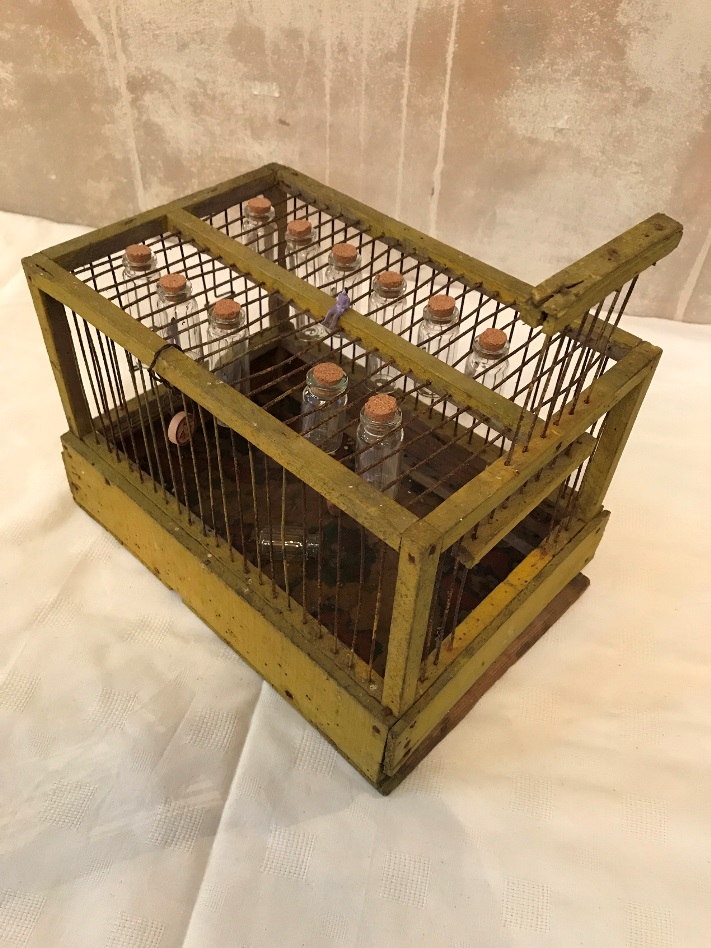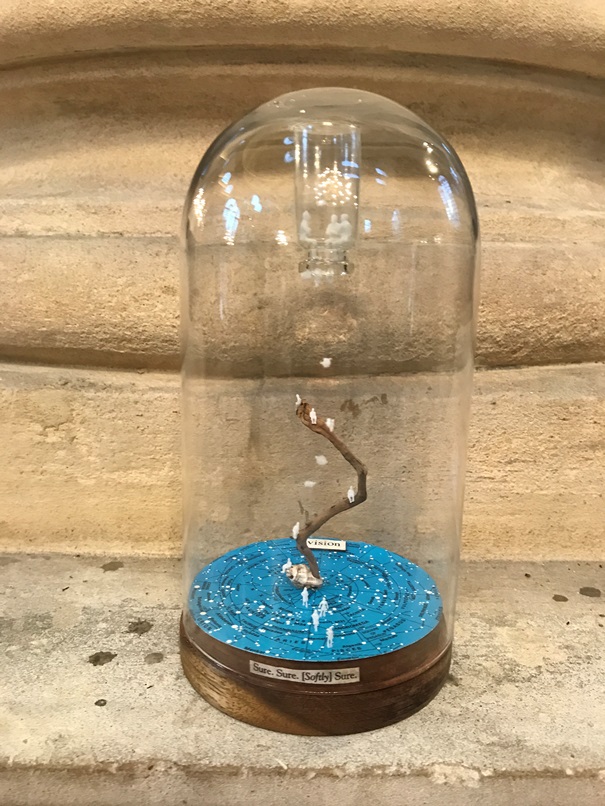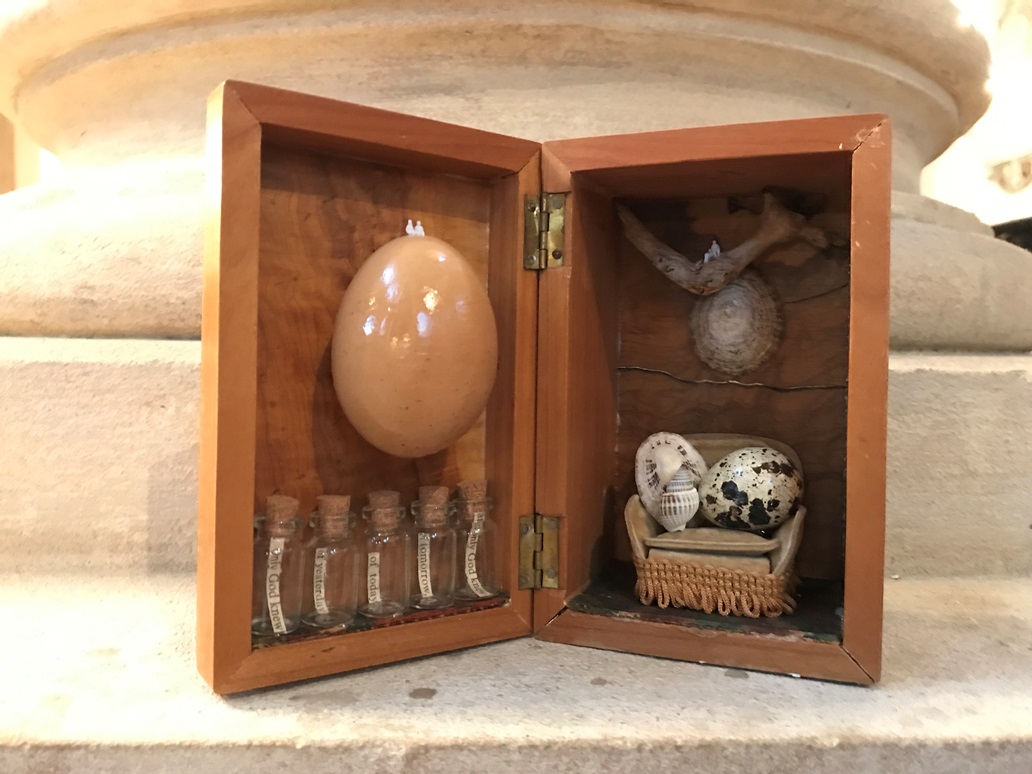Harrold, Tim
Looking for clues: the cryptic, the puzzling and the parabolic in the search for meaning
Tim Harrold is a member of the commission4mission group of mostly Christian artists in the U.K. In September 2017 they held their annual group show in the Christopher Wren designed church of St Stephen Walbrook in the City of London. Tim showed three pieces, which are shown and described here.
His work utilises a three-dimensional assemblage style, bringing together found and sourced elements into visual parables. Tim calls this perceptualism, defining it as where the conceptual and metaphysical or the numinous meet.
The signature traits and recurring themes of this body of work are a playfulness with scale in dioramic settings, and the use of architectural figures to emphasise narrative, and the application of spiritual metaphor. The observer is drawn through the fourth wall into wondrous new visions, and the messages of those visions reveal themselves back through that fourth wall.
Hymn No.42
completed 30.1.2017
readymade sculpture
H8" x W8" x D12"
A cage. An old, wooden, unkempt, pale green cage. Handmade, rustic, roughly crafted - for a ferret or a small song bird? At the front, a door that slides up and down: it is open.
There's a gap below the front panel that suggests some sort of tray may once have slid in and out.
Inside, hanging from between the metal rods that constitute the cage 'walls', are two rows of small corked glass bottles. Inside each bottle is an '0 gauge' figure, all similarly attired. The figures in the left wear one dull colour, the figures on the right, another. They are more or less uniform, regimented, bottled up. Air tight specimens.
However... one bottle has fallen, it seems. It lies on the linoleum floor, the cork uncorked to one side. And the bottle is empty.
The two neat rows of hung laboratory-like specimens above now have an empty space. It is as if the character in that bottle has realised something of their predicament and created enough disturbance as to cause the confinement that defined them to fall and break open.
We find that character sitting on the top of the cage, outside the system, perhaps enjoying freedom for the first time.
On a little bit of old rusty wire hangs an old wooden lotto counter from a long-lost parlour game. On it is the number 42. Ah yes, the old Hitchhikers' joke: it's the number that the computer works out is 'the answer to life, the universe and everything'. Of course, it isn't.
So, actually, it's not a joke. It is a wryly humorous panacea for the human condition, a facade behind which mankind hides for lack of truth and understanding of The Truth.
For our awakened sleeper, the door was open all along. And once outside the box, the realisation that there never was a box.
Psalm 124:7, Luke 4:18-19, John 8:32/36, Galatians 5:1, TS Eliot, Choruses from The Rock.
Vision in a Glass Dome
completed 28.8.2017
freestanding construction
H8" x W4"
A glass dome sits on a base on which is a map of the constellations of the northern hemisphere. In the centre of this cosmos is a twig - representing a jagged, bare tree, reaching up into the vacuum of space.
The fridge magnet word vision appears at the back of the base area. On the front of the base are words taken from a newspaper:
Sure. Sure. [Softly] Sure.
On the twig sit small, plain, anonymous figures. At the foot of this 'cosmic tree', similar figures are seen walking away from it towards the edge of the base. Other figures are seen walking up the inside of the glass dome. They're on a journey of discovery, drawn by an invisible but irresistible force.
At the apex of the dome hangs a small glass bottle, the neck facing downwards, almost over the top of the twig. Inside the lip of the bottle sit three bigger anonymous figures.
One smaller figure walks down the outside (or is it up?), and two of the small figures sit upside down (or is it the right way up?) on the lip of the bottle. The source of the irresistibility is inevitably discovered, and a new journey is just beginning.
Jeremiah 33:3, Psalm 147:4, Andrei Rublev, The Trinity, Paul Mason, Quantum Glory
God Only Knew
12.12.2016
boxed assemblage
H6" x W8.25" x D4"
A small wooden box opens to reveal another world, a miniature theatrical vision full of mystery, wonder and metaphor.
Standing on one end, the lid opens to the left, with the main part of the box on the right.
In the deeper part, there is a toy armchair on a linoleum floor. Sitting on the chair are a quail's egg, a limpet shell and a spiralled sea snail shell. Above them, another limpet shell adorns the back wall (actually, the base) of the box, just above a thin crack through which the light can be seen. Partly obscuring this, a little gnarly twig spans the interior; toe small figures sit in the middle, on the twig's bend.
In the shallow part stand five small corked glass bottles, also on linoleum. Each bottle contains a brief phrase cut from a newspaper article. These read like a poem, and are, from left to right:
Only God knew
of yesterday
of today
of tomorrow,
and only God knew
Above these bottles is a hovering hen's egg. Sitting in a small hole at the top are two little people.
Maybe these are two scenes showing the same two characters in different tableaux. There is a timelessness and a nostalgia for something just beyond our memory. There is a poetic inference of metaphysical reality.There is a serendipitous symbolism that seems simultaneously familiar and yet oblique. The perplexing perspectives and ratios of the found objects juxtapose with the surprise of the marvellously perceptual.
There is an emerging, and there is eternity, and - ear to shell - the echo of an endless sea.
Psalm 139:13-18, Ecclesiastes 3:11, Joseph Cornell and his worlds in a box, Giorgio de Chirico and his sculoa metafisica, Rene Magritte and his Surrealist trompe l'oeil, Andrei Tarkovsky, Mirror.
Also shown at the opening night of Vision on 4.9.17, was Endeavour (2017), a 70-minute long movie of 70 found poems set to 70 ambient tunes and 70 short films made by Tim and his son Jonny, who edited and produced the final piece. Music by Tim with Richie Ballah, Matt Chapman, Matt Leeder, Mark Stirk, and Gareth Marsh, who also did the final production work.





